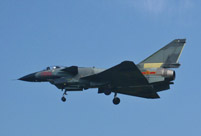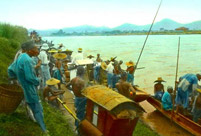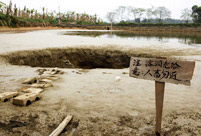

Recently, an article titled “If World War III Erupted in Asia” was published on the U.S. foreign policy website National Interest. The premise of the article was speculation about what would happen if a naval battle occurred between China and the U.S.
A month ago, the same website published another story titled “Saving the South China Sea without Starting World War III.” That article went on at length about the role the U.S. should play in the South China Sea.
But what those U.S. media sources are really doing is distorting information and fear-mongering. By repeatedly citing terms like "transportation routes," "maritime security," "navy" and "submarine," those articles seem to claim that the region’s security is hanging by a thread.
They also aim to put the blame on China. By blaming China’s development for the instability in the South China Sea and misrepresenting China's activities in the region, Western media is attempting to find new selling points for the China Threat Theory.
There is no doubt that the U.S. is the major force behind this operation. And U.S. media has several important things to gain by publicly speculating on a possible World War III.
Firstly, the U.S. military could strengthen its presence in the Asia-Pacific region if other countries become nervous about a potential large-scale conflict. Increasing military presence is an important part of the U.S. "Asia-Pacific Rebalance" strategy. In recent years, the U.S. has already carried out multiple military operations in the Asia-Pacific region under the guise of "responding to China."
Secondly, the U.S. is assisting in the one-sided international arbitration proposed by the Philippines. By painting China as a bully, the U.S. tries to label the Philippines as the meek, blameless victim, deserving of international sympathy. This way, the U.S. can not only cover up the Philippines' provocation against China's sovereignty, but can also attack China's ability to safeguard its own territory.
Thirdly, the U.S. wants to consolidate its power. By bringing attention to a so-called “security problem” in the South China Sea, the U.S. can further solidify its ties with allies and reinforce its position at the head of an allied network.
The U.S. has already claimed that it will carry out "joint patrols" with the Philippines, even calling on Japan and Australia to join them. If this happens, the cooperation framework of U.S.-Japan-Australia and U.S.-Japan-Australia-India will be cemented.
It is also likely that the U.S. will continue trying to win support on the South China Sea issue during the G7 Summit to be held next month.
The U.S. should be aware that peace and development are the only constructive path forward for a community with a shared destiny. Speculation about a possible World War III is in no way useful and actually quite harmful.
In today’s world, the containment strategy adopted during the Cold War has no place in global politics. China is confident in its ability to overcome obstacles and peacefully realize the "Chinese Dream." The U.S. must see China's development as an opportunity rather than an antagonistic challenge; an attempt to hinder China’s rise will only end badly.
The U.S. has agreed to build a new type of major-country relationship with China. Both countries should uphold the principles of non-conflict, non-confrontation, mutual respect and mutually beneficial cooperation. Inciting disputes and speculating about war will not lead to strong China-U.S. ties.
(The author is an expert on international affairs.)
 The evolution of J-10 fighter
The evolution of J-10 fighter Top 10 Asian beauties in 2016
Top 10 Asian beauties in 2016 What's happening in Xisha Islands?
What's happening in Xisha Islands? When female soldiers meet flowers
When female soldiers meet flowers North Sea Fleet conducts drill in West Pacific Ocean
North Sea Fleet conducts drill in West Pacific Ocean Old photos record the change of Sichuan over a century
Old photos record the change of Sichuan over a century Breathtaking aerial photos of tulip blossoms in C China
Breathtaking aerial photos of tulip blossoms in C China Horrific: Pit swallows 25 tons of fish overnight
Horrific: Pit swallows 25 tons of fish overnight Vietnamese Su-30 fighters fly over Nanwei Island in South China Sea
Vietnamese Su-30 fighters fly over Nanwei Island in South China Sea Top 20 hottest women in the world in 2014
Top 20 hottest women in the world in 2014 Top 10 hardest languages to learn
Top 10 hardest languages to learn 10 Chinese female stars with most beautiful faces
10 Chinese female stars with most beautiful faces China’s Top 10 Unique Bridges, Highways and Roads
China’s Top 10 Unique Bridges, Highways and Roads Code spy sentenced to death
Code spy sentenced to death Toxic schools raise ‘Love Canal’ spectre
Toxic schools raise ‘Love Canal’ spectre Forum on anti-communist purge in Indonesia laudable
Forum on anti-communist purge in Indonesia laudable Courier firm calls for people to respect employees after video of beating goes viral
Courier firm calls for people to respect employees after video of beating goes viralDay|Week